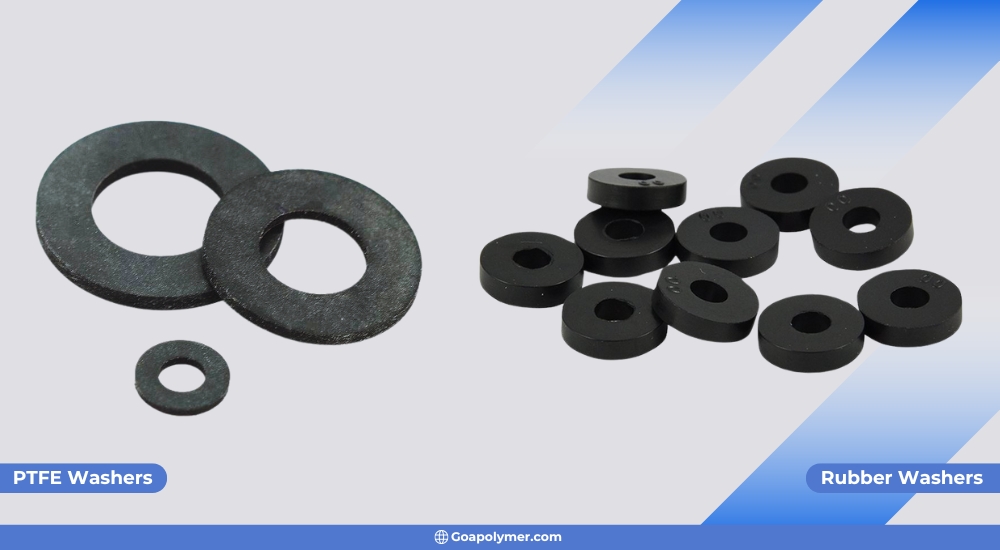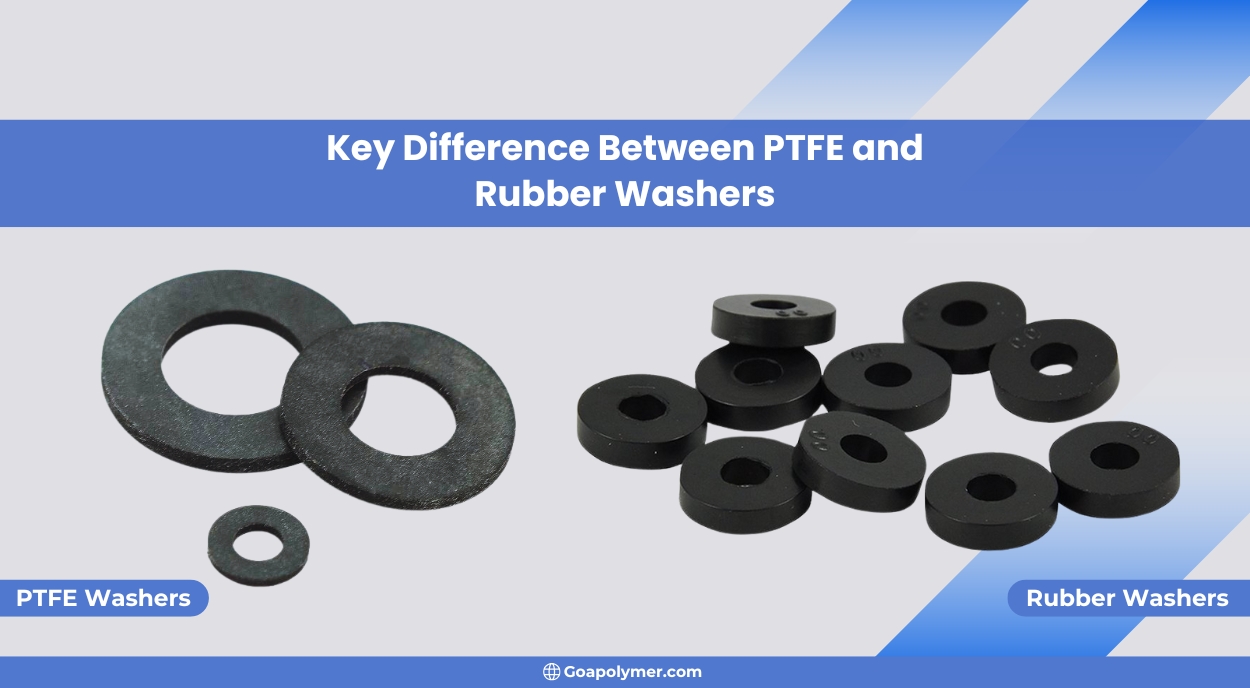A washer is tiny, but it’s crucial in many machines and devices. These parts perform the functions of sealing, preventing damage, and holding parts together. You may not see them frequently, but you will find that washers are a massive part of most everyday objects, from the plumbing in your home to many electrical devices and even your car. The various washers available, PTFE washers and rubber washers are among the most used types.
In this blog, we will compare PTFE washers and rubber washers in detail. We will state their uses, advantages, and reasons for opting for one as compared to the other under certain situations.
What Are PTFE Washers?
PTFE is best known as the material used to make Teflon. You often find Teflon on non-stick cooking pots and pans. Manufacturers use the PTFE washer where they need high chemical or heat resistance. The advantages of PTFE washers are:
- Chemical Resistance: PTFE is almost impervious to the vast majority of chemicals; hence, PTFE washers can be used in chemical plants or the existence of any other harsh substance.
- Temperature Resistance: PTFE washers can sustain temperatures from -200°C to +260°C; therefore, it is fit for purposes of high-temperature applications.
- Low Friction: Yet another of the many benefits provided by PTFE washers is their ability to reduce friction within external mechanisms. These beauties are used in such cases as moving parts where that very friction causes wear and tear.
- Electrical Insulation: PTFE is also a great electrical insulator. PTFE washers are commonly used in electrical and electronic applications. They shield delicate parts from electrical damage. They protect against electrical currents.
- Non-Stick Properties: PTFE features a low coefficient of friction and helps in most applications, where the materials slide over each other. Industrially, this property is used in conveyors and the components of machines for smooth movement.
What Are Rubber Washers?

Rubber washers are made from various elastomers. These include neoprene, nitrile, EPDM, and silicone. All four types of rubber put forth individual properties relevant to certain applications. The common helpful features of rubber washers are:
- Flexibility: Most washers made of rubber have an elastic property and allow for making a stiff seal to prevent any possible leakage in any plumbing or car systems.
- Water Resistance: Rubber washer is water resistance material that’s why it is used in all situations and industries, such as plumbing work.
- Cost-Effectiveness: Rubber washer is a cost effective material and cheap in compare to the PTFE washer, that’s why this is more preferable than PTFE washer.
- Shock Absorption: Rubber washers are effective for shock-proofing and vibration-proofing. They are used in machines or equipment that need protection from movement.
When to Use PTFE Washers?
PTFE washers are the only ones to be used in an application where they have their specific requirements. If the worksite conditions are not conducive to high temperatures or corrosive chemicals, or if there is a need for a very low-friction solution, PTFE washers can be maximized. Typical applications for PTFE washers comprise:
- Chemical Industries: In chemical plants that often use PTFE, it becomes one of the materials of choice when preventing leaks occurring from pipework, tanks, and valves.
- Electronics: For insulating properties to prevent electrical shorts, PTFE washers are placed inside electronic apparatus.
- Automotive Applications: These washers can be located in automotive systems, especially in high-temperature or oil areas.
When to Use Rubber Washers?
Rubber washers are the best choice for flexibility, shock absorption, and water resistance. They make sealing tight, and thus they have become indispensable for many systems. This assessment includes common applications of rubber washers:
- Plumbing Systems: Rubber washers are generally used to seal taps, pipes, and drains, they can also be used with appliances to seek out and plug up leaks within the plumbing system.
- Automotive Applications: They are sometimes also used in vehicles to dampen vibrations and noises, for example in the case of the suspension or exhaust system.
- General Machinery: The main function of rubber washers in units is to shield the delicate parts from shock or vibration.
Choosing the Right Washer for Your Application
PTFE washers and rubber washers each have unique benefits. You should think about what your application needs. The following set of indicators should help direct your decision-making process:
- For extreme chemical resistance, heat, and friction, PTFE washers are the best choice. They are perfect for industrial use. They are durable and can withstand tough conditions.
- For a cost-effective way to seal against water or air leaks, choose rubber washers. They are flexible and compressible, making them the best option. They are great for plumbing and general household applications.
- PTFE washers rank top for electrical applications, given their good insulating characteristics.
- PTFE washers would be the ones for machines with hard movement and less friction. They would ensure smooth operation and diminish wear and tear on the moving parts.
Conclusion
PTFE washers along with rubber washers serve some significant benefits on their merit against different applications. PTFE function is most useful in situations where high temperature, highly corrosive chemical, and very low friction environments are found. At the same time, rubber washers are generally elastic, inexpensive, and good for sealing domestic functions such as plumbing and car use.
When you choose a washer, always consider the specific needs of your application. Consider the materials you use. Think about how hot they get and if they come into contact with other chemicals. PTFE washers and rubber washers are key for tight seals. They help ensure smooth operation across many industries.



